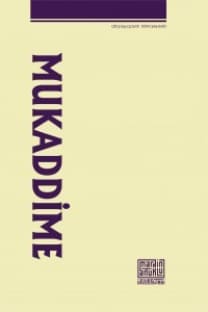PAUL TILLICH'İN TANRI ANLAYIŞI
Paul Tillich, nihai kaygı, korelasyon yöntemi, Tanrı, sembolizm
PAUL TILLICH'İN TANRI ANLAYIŞI
Paul Tillich, ultimate concern, method of correlation, God, symbolism.,
___
- Çınar, A. (2007). Varoluşçu Teoloji. İstanbul: İz.
- Alston, W.P. (2006). Tillich, Paul. The Encyclopedia of Philosophy, 2.ed., Vol. Donald M. Borchert (Ed). Thomson-Gale.
- Coburn, Robert C. (1996). God, Revelation and Religious Truth: Some Themes and Problems in the Theology of Tillich, Paul. Faith and Philosophy, 13:1.
- Edwards, D.L. (1963). A New Stirring in English Christianity. The Honest To God Debate, by David L. Edwards (ed). London: SCM Press.
- Hartshorne, C. (1952). Tillich‟s Doctirine of God. The Theology of Tillich, Paul, Charles W Kegley & Robert W Bretall (ed). New York: The Macmillan.
- Hick, J. (1963). Philosophy of Religion. Englewood Cliffs: Prentice Hall.
- Hook, S. (1962). The Atheism of Tillich, Paul. Religious Experience and Truth, Sidney Hook (ed). London: Oliver and Boyd.
- Randall jr, J.H. (1952). The Ontology of Paul Tillich. The Theology of Paul Tillich, Charles W. Kegley & Robert W. Bretall (ed). New York: The Macmillan.
- Rowe, W. L. (1968). Religious Symbols and God. Chicago: Chicago University Press.
- Tillich, P. (1951). Systematic Theology I. Chicago: The Chicago University Press.
- Tillich, P. (1955). Biblical Religion and Search for Ultimate Reality. Chicago: Chicago University Press.
- Tillich, P. (1957). Dynamics of Faith. New York: Harper & Row.
- Tillich, P. (1957). Systematic Theology II. Chicago: The Chicago University Press.
- Tillich, P. (1963). The Protestant Era, tr: James Luther Adams. Chicago: Chicago University Press.
- Tillich, P., In Brown, D. M. (1965). Ultimate concern: Tillich in dialogue. New York: Harper & Row.
- Tillich, P. (1968). A History of Christian Thought. New York: Touchstone Book.
- Tillich, P. (1969). The Courage to Be. New Haven: Yale University Press.
- Tillich, P. (1969). Theology of Culture. New York: Oxford University Press. Tillich, P. (1976). The Shaking of Foundations, New York: Scribner‟s.
- Tillich, P. (1998). The lost Dimension in Religion. The Spiritual Situation in Our Technical Society, J. Mark Thomas (ed.). Mercer University Press: Macon-Georgia).
- Walter K. (1961). Critique of Religion and Philosophy, New York: Anchor Books.
- Williams, J. R. (1965). Contemporary Existentialism and Christian Faith. Englewood Cliffs: Prentice Hall.
- ISSN: 1309-6087
- Yayın Aralığı: 2
- Başlangıç: 2010
- Yayıncı: MARDİN ARTUKLU ÜNİVERSİTESİ
MARX'TA ÖZNE NESNE İLİŞKİSİ ÜZERİNE
ÇALIŞTAY TANITIM VE DEĞERLENDİRMESİ
PAUL TILLICH'İN TANRI ANLAYIŞI
ANADOLUYLA TANIŞAN TÜRKLER'E KÜLTÜR TARİHİ AÇISINDAN BAKIŞLAR
HIZIRLA KIRK SAAT'TE DİNİ REFERANSLAR
SOSYOTERAPİ: SOSYOLOJİNİN TERAPÖTİK KULLANIMI
HIZIRLA KIRK SAAT'TE DİNİ REFERANSLAR
TİRE VAKIF NECİP PAŞA KÜTÜPHANESİ VE BİRKAÇ TEZHİPLİ EL YAZMASI
ANADOLUYLA TANIŞAN TÜRKLER'E KÜLTÜR TARİHİ AÇISINDAN BAKIŞLAR
